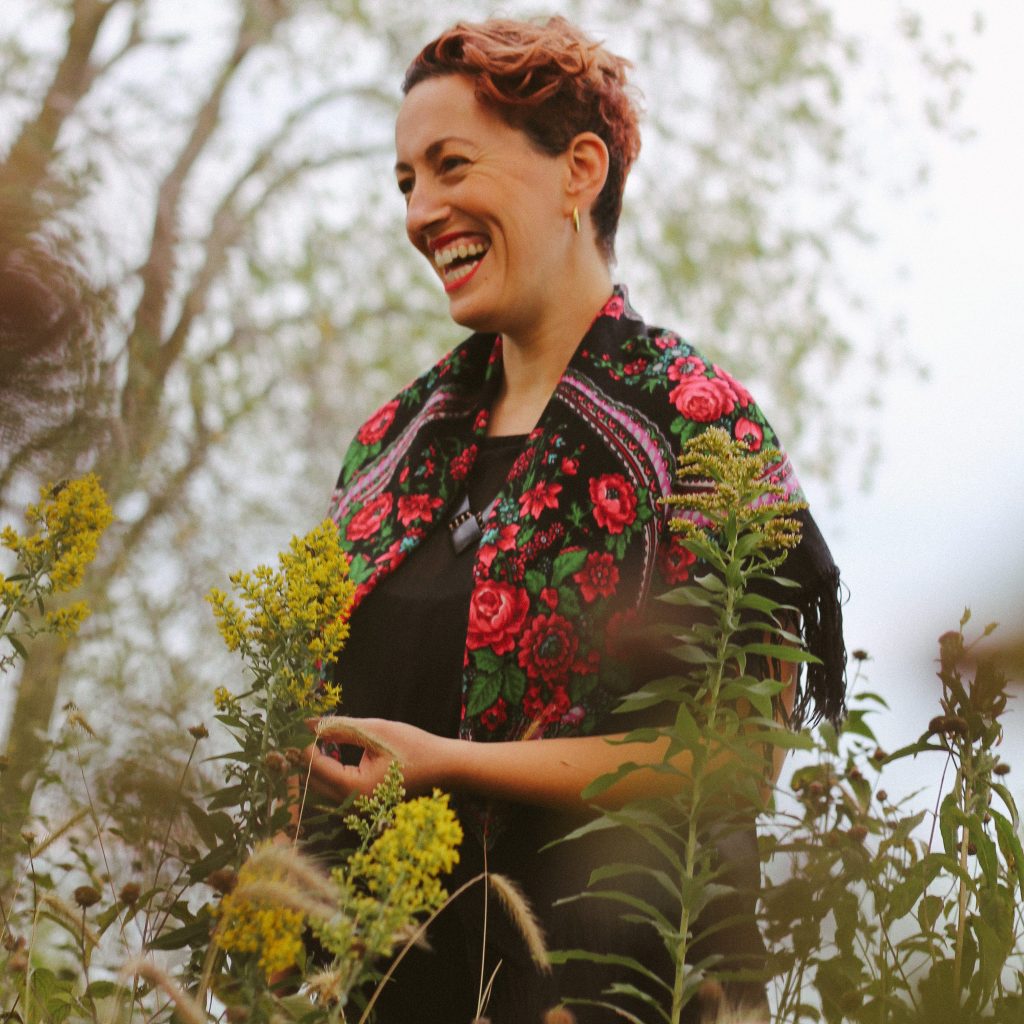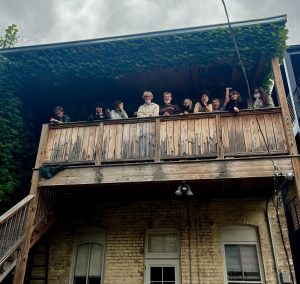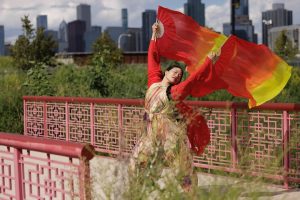
Elbow Grease is a social media intervention that Chenoa Baker created in 2021 as a response to the unseen female labor in an MFA/Boston Union protest. The name comes from a part of the plot of Funny in Farsi by Firoozeh Dumas where an Iranian woman who moved to the US in the 70s was told that she needed elbow grease to remove a stain but because of linguistic differences, she did not understand the idiom and asked a cashier what aisle elbow grease is in. The cashier then explained that it requires scrubbing and pressure which is a cross-cultural concept that places the woman, in this case, as the agent of change.
In partnership with Sixty Inches From Center, Elbow Grease has asked writers to respond to the Elbow Grease mission:
Elbow Grease combines media, art, and vernacular images to recognize women and nonbinary folks’ labor. While this idiom is not linguistically universal, its concept is palpable and underrecognized in all capitalist systems across differences. There are multiple factors influencing labor—race, color, gender, education, sex, immigration status, and class, to name just a few. There are also multiple linguistic terms to describe this labor. Overall, this project seeks to recognize and interrogate labor’s visual grammar while highlighting its representations’ multiplicity.
Elbow Grease logo by Tianna Garland.
____________________________________________________________________________
In an Orwellian twist of fate, I was born in 1984 in Soviet Belarus. My mama brought me into the world in Maternity Ward #5 after four hours of unmedicated labor: there were no epidurals, no c-sections, and no medical bills. Hospitals were state-funded, there was no private health insurance, and doctors made middle-class wages — thus, there was no profit to be made from birthing people. In addition to a healthy baby, my mama left the hospital with a full year of maternity leave, a lifetime of free healthcare (including free and legal abortions), free childcare, free pre-K, subsidized kindergarten, and free higher education. I consider these to be basic human rights, but some might call them the evils of communism.
Here, under the warm glow of capitalism, over 30% of birthing people deliver via C-section (80% of which are not medically necessary), childcare is one of the most expensive and inaccessible basic needs, abortions are illegal in 14 states, there are 512 anti-trans bills, and maternal mortality rates for Black and Indigenous birthing people are four times that of their white peers. Reproductive injustice is so rampant that it’s easy to give up hope. This is why I’m turning to the wisdom of Black and Brown women and non-binary folks who have been battling these injustices for centuries.
The following is a condensed conversation with my dear friend Mekazin Alexander, a Black birth worker who has been delivering babies on the South Side of Chicago for over 45 years and is the Executive Director of BA NIA; and Noshaba Bhattia, a Pakistani Muslim Full-Spectrum Doula and Sexual & Reproductive Health Educator, who helped bring my baby into the world. The transcripts have been edited for clarity and length
Irina Zadov: Mekazin, you were such a guiding force in my journey toward motherhood. Can you please share how you found your way to birth work?
Mekazin Alexander: We initially came together—four Black women—in a study group and we began to study different types of births that occurred in different places in the world. We focused on Native American, East Indian, Afrikan, and African American cultures. We did a lot of studying on what traditional midwives did to support women during labor and delivery. What we found was that women who were taking care of one another in the birthing process were discredited by men in the medical field who really had no clue what was needed when the woman [experienced] labor and delivery. But [they] saw the monetary benefit of taking it out of a layperson’s hands and putting it into the medical system.
This was really interesting for African Americans because we weren’t even allowed to be in the hospital to give birth until around 1960. They began to discredit lay midwives, and Black women gave birth by the hands of Caucasian men. As we began to study and then talk to women, we found that a lot of birthing people were having a high amount of C-sections. We looked at that and realized that not only was it based on systemic racism but it was also based on economics. We believed we really needed to be that vehicle to support women in birthing.
We began to study with other midwives and hone our craft. Quite frankly, what we were doing was illegal because it was not legal to have [home] birth in Illinois at the time (1970s). We were pioneers. We were underground. There was a lot of word of mouth. We have delivered many children during that time. We realized that at some point, we needed to bring this to an end because we could be arrested and we’d be away from our families and, being African American women, we would be made the example.
Because we didn’t want that, we shut down what we did. Now people look at us as traditional midwives, and we’ve learned a lot [by] participating in the miracle of supporting moms and birthing people through the birthing process. Because we moved into [the] terminology of “reproductive justice,” I say that because what we were doing was reproductive justice and birth justice: we were giving women the choice back then and respecting their rights to have the birth the way they wanted.
That’s what started me on that path. Since that time, I co-founded BA NIA which is a reproductive and birth justice non-profit on the South Side of Chicago. We still provide choice through education. When we set out to do BA NIA, we made sure that we were credentialed up the yin yang, because people need to have that security of knowing you were trained somewhere even though we had 30-plus years under our belt.
IZ: Thank you so much for sharing that powerful story. So what does reproductive justice mean to you?
MA: It’s a lot for me. It means reduction of domestic violence, access to contraceptives, totally having control of your birth, more home births, [and] financial equality. Birth is truly a part of that, because we are the ones who, regardless of what our sexual orientation is, if we’re able to birth, then we should have the right to make decisions every step of the way as it relates to our bodies. We should not be subjected to violence. We should not be told by people who don’t have our best interest at heart what’s best for us. That right to choose is important.
My vision for women and birthing people [is] to be empowered. Our platform, BA NIA, is really about education and advocacy. We believe that if a birthing person is educated and understands that they have a choice and can advocate for themselves, [they can] feel empowered enough to advocate for themselves—we’re that path, and at times we are their voice. At some point, those birth and health inequities [will] subside because the community has found ways to resolve their issues. That’s part of the vision.
IZ: As a full-time birth assistant who runs her own nonprofit, has six grandkids to take care of, stewards a community garden, employs young people, and is such a pillar in the community—what do you need for a sense of justice for your labor?
MA: I need space to be creative, to sometimes step away to get another perspective. As I grow, I’m realizing that I’m a visionary. I never took ownership of that, but I believe I am because of how things have ebbed and flowed. For me, having people around me who support the vision [with sincerity]… I always say that people should come seeking nothing in return, but to get the work done ‘cause they appreciate what’s out there, what people are trying to do, and try to be a part of that change, that solution, and make a contribution.
IZ: Thank you so much Mekazin. Noshaba, what drew you to birthwork?
Noshaba Bhatti: We as women, femmes, and non-binary people, we are taught to be afraid of our bodies and the wisdom that they hold. Our expression of being ourselves is scary to them. That’s where anti-femme phobia, transphobia, and cishet patriarchy comes from. We are so disconnected from our bodies because of colonialism and capitalism that we are vulnerable to people who we see as authority figures.
If I can facilitate a person getting all the info that they need to make informed choices and sit within their own power, then what can’t they do? When you give birth that way, what can’t we do? It changes how we parent. It changes our relationships with our partners. Supporting birthing people, in birth, in creating pregnancies, and in postpartum—all of it is my activism. Within that space there are great implications for what happens for people later, how they show up for themselves and in their communities.
IZ: As someone who facilitates such a powerful and transformative process, how do you find your power? What are your supports and what are the supports that you wish you had to sustain this work?
NB: There are times when I do back-to-back births and I’m like, “I can’t do this anymore.” I get the call and I ask myself “how am I going to be present? I’m so exhausted.” But when I get that call, I’m so on; it’s like something else takes over. I’m fully present at births and don’t take breaks. I tune into my clients and can be at births for days on end without a break. Once I leave, I’m so full from witnessing so much love, vulnerability, and power. And the trust people put in me is sacred.
How do I sustain this work? My partner is the most amazing person in the world—he takes on a lot of the childcare while I’m working—and I want to find a better balance. I’m a bit of a workaholic—so it’s not just that I have to do all of these things for my clients—I also have kids and a partner [that] need me too. So it’s not that I’m gone working and then I’m home resting and everyone else is leaving me alone.
Most doulas, if they’re doing this work regularly, tend to burn out in 3-5 years. What would make it more sustainable is if our entire society were to shift. Most of us don’t have a lot of support and it’s not because we don’t have family or community—although some of us don’t. Even when we do, we live in our little boxes separated from each other and separated from our land which makes it really hard to live communally and share labor, especially labor historically reserved for women and femmes. I think of circles where we have our separation but we’re interconnected; where we have gardens [to] grow our food and we share childcare and responsibilities around feeding each other; that would make all of it more sustainable. It would also be better for our kids because we are not meant to be everything to our kids. But often we are, even when we have community, because of capitalism.
IZ: You talk about supporting birthing people in accessing their own power, but what are some of the sources of your power and how do you nurture it?
NB: People have their own power. I see my work as holding space and protecting space for people, so that in the work that they do they’re able to access it for themselves, feel it, connect with it, and let it emanate from them and sit in that. Where do I find my own power? From the time that I was little, my core memories are rooted in justice. Doing this work fuels me. In showing up for other people, I feel like I’m sitting in my purpose and it’s what I’m best at doing. I’m a flawed human being and, as a care provider and doula, I’m always going to have so much to learn, [but] I’m really good at centering other people. When I’m doing that, that is when I’m sitting within my own power. It’s actually the work itself that does it for me. Something else takes over in that birthing space. I’m Muslim and for me, every single act that I do and every behavior that is in the service of justice and liberation is an act of worship. In doing that work, I feel like I am fully actualized in those moments and fully alive in those moments.

About the Author: Irina Zadov (they/she) is a mama, artist, educator, and cultural organizer. They are a queer post-Soviet Jewish immigrant and settler on the unceded territories of the Three Fires Confederacy: Ojibwe, Odawa, and Potawatomi. Their practice explores themes of diasporism, state violence, community resistance, and healing. Irina’s creative practice is rooted in collaboration and co-creation with Black, Indigenous, immigrant, and LGBTQIA+ communities. Their public programming, youth work, and cultural practice have been featured in and co-created with: Hyde Park Art Center, Chicago Art Department, Smart Museum of Art, National Museum of Mexican Art, DuSable Museum of African American History, South Side Community Art Center, Cambodian American Heritage Museum and Killing Fields, Museum of Contemporary Art Chicago, Chicago Freedom School, Jane Addams Hull-House Museum, AMFM, Englewood Line, Chicago Public Library, Chicago Public Parks, 6018North, Chicago Cultural Center, Cambodian Institute of Peace in Cambodia, and TRANSITIONS Festival of Jewish Contemporary Arts in Berlin, Germany. Learn more about their work at www.irinazadov.com



